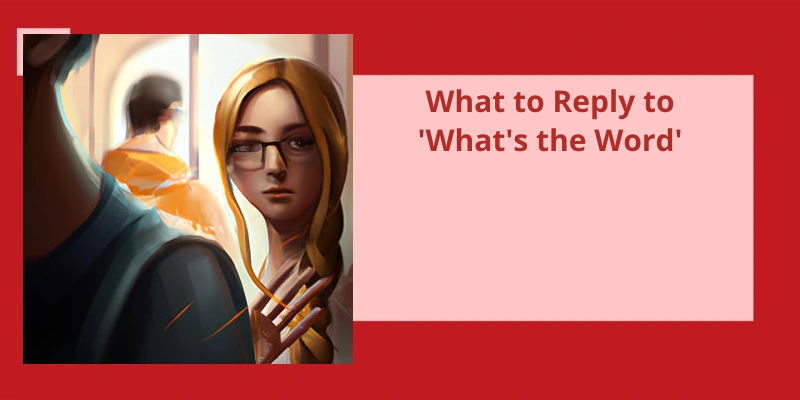In today's world, communication plays a vital role in our lives. We’re constantly engaged in conversations with friends, family, colleagues, and even strangers via various means of communication such as text messages, social media, and emails. However, with the rapid advancement of technology and the rise of artificial intelligence, it’s become increasingly difficult to tell whether the responses we receive are from real humans or from computers.
How Do You Respond to Someone Saying Word?
When it comes to responding to someone saying “Word,” the appropriate action may vary depending on the tone and meaning of the statement. Generally, if someone says “Word” after making a statement, it means that they agree with or support what was said. In this case, simply responding with “Word” can be a polite way to affirm their statement.
However, “Word” can also be used to express surprise or shock at what someone said. In this case, it’s a good idea to follow up with a question to keep the conversation going. Asking for more details or clarification can show that you’re interested in their perspective and want to learn more.
If the conversation is more casual or informal, using “Word” as a response may be appropriate.
Whether you agree with what was said or are simply surprised by it, responding with a thoughtful question or comment can help to keep the conversation flowing and build stronger connections with others.
In some cases, “Word” can also be used sarcastically or as a way to express skepticism or disbelief. If you’re unsure of the tone or intention behind the statement, it may be best to clarify before responding. Asking for clarification or using a neutral response can help to avoid misunderstandings and keep the conversation productive.
Now that we’ve a clear understanding of what the word “response” means, let’s explore it’s various uses and contexts in different fields. From the realm of customer service to scientific research, the concept of response is a crucial aspect of communication and analysis. Join us as we delve deeper into the intricacies of this word and it’s significance in our daily lives.
What Does the Response Word Mean?
The word “response” is a common word that refers to an act of responding or reacting to a certain situation, request, or stimulus. It can take different forms, depending on the context. It may involve a verbal or written reply, a physical gesture, a facial expression, or an action.
In the context of communication, a response is an essential part of a conversation. It allows people to share information, express opinions, clarify misunderstandings, or address concerns. A good response should be clear, concise, and relevant to the topic at hand. It should also be respectful, empathetic, and mindful of the other persons feelings. Sometimes, a response may require some thought or reflection before it’s given, especially if the topic is sensitive or complex.
In the context of customer service, a response is a crucial element in building trust, loyalty, and satisfaction. It demonstrates that a business or organization is attentive to it’s customers needs and is willing to address their concerns or complaints. A prompt and effective response can turn a negative experience into a positive one and can even create new opportunities for the business. Therefore, many companies invest in training their staff to handle responses with professionalism, empathy, and accuracy.
In the context of religious rituals, a response refers to a specific type of liturgical text or chant. It’s usually sung or recited by the congregation or choir in response to the priest or officiants words. This practice has been part of many religious traditions for centuries, and it serves as a way of involving the whole community in the worship service. The response may have a symbolic or theological significance, and it can vary depending on the time of the year, the occasion, or the religious tradition.
It involves a complex interplay of neural pathways, hormones, and neurotransmitters that can affect the persons behavior, mood, or physical state. Scientists study responses to understand human perception, cognition, emotion, and motivation. They use various methods, such as brain imaging, psychophysics, and genetics, to investigate the mechanisms underlying responses and their variability across individuals. This research has practical implications for many fields, including medicine, education, and technology.
Conclusion
Rather than focusing on the phrase itself, pay attention to the rest of their message and respond accordingly. Remember, effective communication is key in any conversation, and actively listening and responding to what the other person is saying is crucial to building strong and meaningful connections with others. So the next time someone says "WTW" or any other expression of surprise, take a moment to listen to their message and respond with empathy and understanding.






